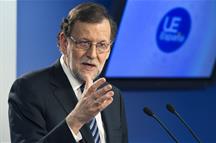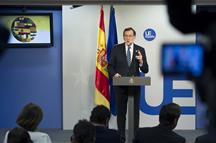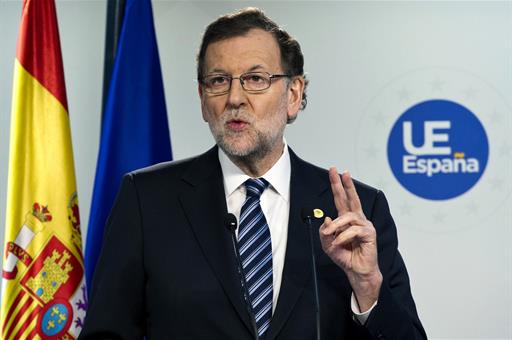"We must not undo the reforms undertaken, but rather push on and improve them", says Mariano Rajoy
President's News - 2017.3.10
Brussels (Belgium)
During the press briefing following the ordinary meeting of the European Council and the informal meeting of the 27, without the United Kingdom, the President of the Government argued that the Council's priorities coincide with the cornerstones of the reform agenda that Spain has undertaken in recent years.
Mariano Rajoy highlighted that the Spanish economy has experienced an unprecedented transformation. "It is an example of recovery, it provides stability to the Euro, it is growing at a faster rate than the other EU countries and is creating jobs. We are the European Union country that is creating the most jobs".
In this regard, the President of the Government stressed that 2017, "provided we are not foolish and we maintain a minimum level of political stability", will be good for Spain from an economic standpoint. "Our forecast is for growth of 2.5% and to create more than 400,000 jobs, but we are working to beat these forecasts". Hence, "we must persevere with the policies we have implemented", he stated.
To his European partners, Mariano Rajoy advocated the aspects that he considers are key for both the European Union and for Spain. "We must not undo the reforms undertaken, but rather push on and, if possible, improve them. At a European level, it is fundamental to maintain and strengthen such initiatives as the European Fund for Strategic Investments (EFSI), known as the Juncker Plan, which is working very well, and also the initiative on youth employment. And we must make an effort to complete the Banking Union".
Boost to trade
 EFE / ArchivoThe President of the Government also advocated extending the single market and continuing to bolster trade as a source of growth and employment. On this point, he remarked that, for the first time ever, Spain has enjoyed "four straight years with a surplus in the foreign trade sector", which "has contributed a great deal" to economic recovery. "At this European Council, we have reiterated this general message of support for trade as a source of well-being, which pleases me greatly", he added.
EFE / ArchivoThe President of the Government also advocated extending the single market and continuing to bolster trade as a source of growth and employment. On this point, he remarked that, for the first time ever, Spain has enjoyed "four straight years with a surplus in the foreign trade sector", which "has contributed a great deal" to economic recovery. "At this European Council, we have reiterated this general message of support for trade as a source of well-being, which pleases me greatly", he added.
Mariano Rajoy highlighted that his EU partners welcomed the recent ratification by the European Parliament of the trade agreement with Canada which, in the case of Spain, means the elimination of 98% of customs tariffs for exports to that country. He also underlined that, at a request from Spain and Portugal, the conclusions of the European Council will expressly include the intention to proceed with the negotiations on the association agreement with the Common Market of the South (MERCOSUR) and to update the agreement with Mexico.
"Whenever Spain has gone overseas, things have gone well. That is why we support free trade agreements and support overseas expansion. We live in a world that is very open at this time, we must have a presence out there and harness all opportunities", he stressed.
Immigration and defence
 Consejo EuropeoWhile economic issues were the main focus of this European Council, other matters were also discussed. Mariano Rajoy commented that, in terms of immigration, the Central Mediterranean remains the main region of concern for his European partners, while Spain considers that we must also pay close attention to the Western Mediterranean route. "This is a challenge that will be with us for quite some time. We must maintain strategic patience, intelligence and generosity. The principles that must prevail in our efforts are dialogue and cooperation with the countries of origin and transit", he declared.
Consejo EuropeoWhile economic issues were the main focus of this European Council, other matters were also discussed. Mariano Rajoy commented that, in terms of immigration, the Central Mediterranean remains the main region of concern for his European partners, while Spain considers that we must also pay close attention to the Western Mediterranean route. "This is a challenge that will be with us for quite some time. We must maintain strategic patience, intelligence and generosity. The principles that must prevail in our efforts are dialogue and cooperation with the countries of origin and transit", he declared.
The European Council also highly rated the new initiatives on internal security and defence issues. According to Mariano Rajoy, "Spain has been at the forefront of the construction of European defence since the very outset. Our country has taken part in all the military missions launched by the EU, including the six missions under way at this time".
On this point, the President of the Government explained that, at a request from Spain, the Council's conclusions contain an annual commitment to remembrance on 11 March each year, the day on which the European Day of Victims of Terrorism is commemorated, and to make progress on this matter.
Informal meeting of the 27
 EFEThe President of the Government explained that the meeting, without the presence of the United Kingdom, was used to debate the future of Europe and to prepare for the Rome Summit on 25 March. The President of the Government argued that "the EU is a success story" and that Europe must do more to respond to the concerns of its citizens", such as employment, healthcare and education, as agreed at the Bratislava Summit.
EFEThe President of the Government explained that the meeting, without the presence of the United Kingdom, was used to debate the future of Europe and to prepare for the Rome Summit on 25 March. The President of the Government argued that "the EU is a success story" and that Europe must do more to respond to the concerns of its citizens", such as employment, healthcare and education, as agreed at the Bratislava Summit.
He also reiterated his commitment to greater integration and stressed the need to complete Banking Union and make progress on structural reforms. That means "having a European budget with the ability to support those States that at any given time face an economic crisis", he said.
Current affairs
The President of the Government claimed that the withdrawal of the United Kingdom from the European Union is not good for the general interests of the EU. "All our countries will need to make more funds available because one of the most important net contributors is leaving". When asked about its impact on Spain, he responded that he cannot offer specific figures since negotiations are yet to begin.
As regards whether Brexit may provide any opportunities for Spain, Mariano Rajoy reaffirmed his "total and absolute" support for the candidature of Barcelona to host the European Medicines Agency, which is presently located in London.
On another note, Mariano Rajoy insisted that he does not want early elections to be called, "because that will prejudice Spain". "It is my intention to continue seeking support so that those issues that most affect the Spanish people as a whole can be pushed through", he said.
More Info
- "I am optimistic about evolution of European and Spanish economies", says Mariano Rajoy (09/03/2017)
- Mariano Rajoy meets with Prime Minister of the Netherlands (09/03/2017)
- European Council and informal meeting of 27 (08/03/2017)
- Press conference by President of the Government after European Council meeting





